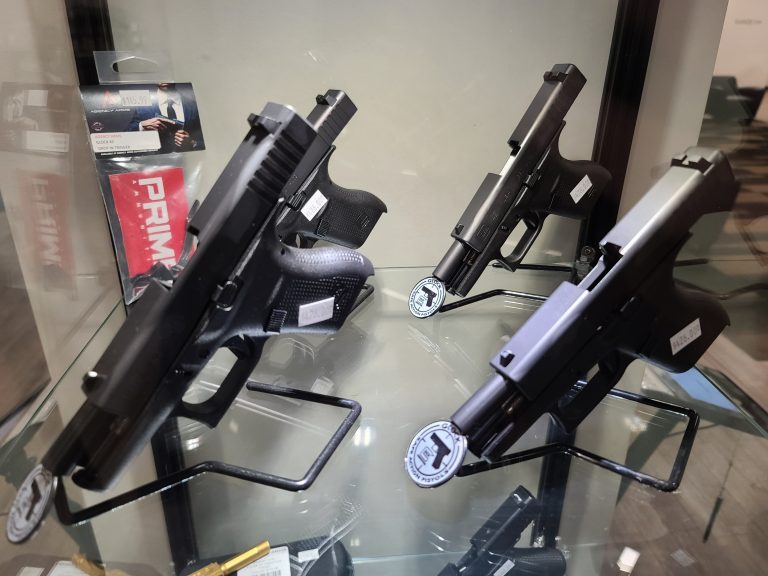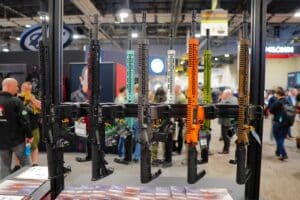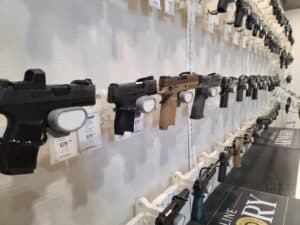For the second time in less than two years, the North Carolina legislature has sent a bill to repeal the state’s Jim Crow-era pistol-purchase-permit law to Governor Roy Cooper’s (D.) desk.
The North Carolina House of Representatives passed Senate Bill 41 on Wednesday with a 70-44 vote. Alongside repealing the 104-year-old law permit-to-purchase requirement, the bill would allow permit holders to carry concealed firearms while attending religious services on school property, allow certain government employees to carry concealed handguns in law enforcement facilities, and create a public education campaign dedicated to safe firearm storage.
The bill’s passage sets up a potential veto showdown with the Democratic governor of an otherwise Republican-dominated state. In 2021, Cooper rejected separate bills to repeal the permit-to-purchase law and allow licensed concealed carry during religious services on school grounds. Republicans in the legislature at the time did not have the votes to override those vetoes.
Since then, Republicans have gained a veto-proof majority in the Senate and are just one vote away from the same in the House. Three Democratic representatives joined their Republican colleagues in voting for Senate Bill 41 on Wednesday, suggesting that a veto override is possible.
Governor Cooper’s office did not respond to a request for comment on the bill’s passage.
Gun-rights groups in the state celebrated the bill’s passage and expressed confidence in its ability to make it into law.
“In passing Senate Bill 41, today was a great victory for the Second Amendment,” Paul Valone, president of Grass Roots North Carolina, said. “We are confident that we will over-ride the inevitable veto by anti-freedom Governor Roy Cooper.”
Gun-control groups decried the bill. Becky Ceartas, executive director of North Carolinians Against Gun Violence (NCGV), said it “politiciz[ed] saving lives.”
“Our Pistol Purchase Permitting system prevents homicides, suicides, mass shootings and domestic violence,” she said. “This is about saving lives throughout North Carolina.”
Under the current process, applicants must appear in person to their local sheriff with a government ID, pay a fee, undergo a background check, and provide a valid reason for owning a pistol. Sheriffs are granted discretion in determining whether the applicant is of “good moral character” before issuing a permit. The law requires a permit to be granted or denied within 14 days of a submitted application.
The purchase permit requirement came under renewed scrutiny during the COVID pandemic when most of the state’s sheriffs’ offices shut down all processing of new pistol permit applications, effectively denying residents the ability to purchase handguns. Once reopened, many sheriffs continued to delay the processing of applications, leading to multiple lawsuits from gun-rights groups.
Opponents of the permit requirement say that it is duplicative of the federal background check required for gun purchases at any licensed dealer. They also say it is a relic of a bygone era when facially neutral laws were used to keep black and brown residents disarmed.
“It just allows everybody, every citizen in the state of North Carolina, to have their constitutional right granted to them so that they can protect their self,” State Representative Jeff McNeely (R.) said of the repeal bill.
Supporters, meanwhile, say that the permit process adds an extra layer of protection in keeping guns out of the wrong hands. They also contend that GOP concern over the law’s Jim Crow-era history is disingenuous.
“As the overwhelmingly white male NC GOP cries ‘Jim Crow!’ they should go ahead and abolish every law under Jim Crow,” Kaaren Haldeman, an NCGV board member, said. “But they don’t want educators to teach our history of racism, so.”
While the historical records at the time of the bill’s passing don’t provide a great deal of detail on any explicitly racial motivations, some scholars contend that the law was used, and continues to be used, to disproportionately target minority communities. A 2021 North Carolina Law Review article found that blacks in certain counties were denied permits at much higher rates than whites between 2015 and 2020.
“In practice, the Wake County Sheriff’s Office rejected 8.37% of White applicants, while rejecting 23.54% of Black applicants,” Nicholas Gallo, the article’s author, wrote. “This amounts to Black applicants experiencing a rejection rate of approximately three times the rate of White applicants. Given Wake County’s similar racial composition to that of North Carolina as a whole, Wake County potentially represents statewide trends.”







Only Members can view comments. Become a member today to join the conversation.